| History of Fiji |
|---|
 |
| Early history |
| Modern history |
| Coup of 2000 |
| Proposed Reconciliation Commission |
| Crisis of 2005–2006 |
| Coup of 2006 |
The timeline below shows the history of the island Fiji , from the ancient times to the present day.
| History of Fiji |
|---|
 |
| Early history |
| Modern history |
| Coup of 2000 |
| Proposed Reconciliation Commission |
| Crisis of 2005–2006 |
| Coup of 2006 |
The timeline below shows the history of the island Fiji , from the ancient times to the present day.
| Date | Event |
|---|---|
| 1500 BC - 1400 BC | Fiji was suggested to have been settled by Micronesian, before Melanesians, but evidence is lacking that this happened - either in oral accounts or geological data, except that of Ma'afu. Archaeological finding suggest long standing occupation of the islands. Cultural and traditional activity is more akin to Polynesian cultural undertaking or vice versa, but one certain impact can be deduced from outside intervention polarizing the indigenous Culture into what it is today. |
| Date | Event |
|---|---|
| 1822 | European settlement begins at Levuka, Fiji's first modern town. |
| 1830 | The first Christian missionaries from Tahiti, Hatai, Arue and Tahaara, arrive at Lakeba, brought via Tonga by the London Missionary Society. |
| 1835 | Methodist missionaries, William Cross and David Cargill, arrive in Lakeba. They are accompanied by emissaries from Taufa'ahau the Tongan high chief and by Josua Mateinaniu, a Fijian from Vulaga who had been converted at Vava'u in 1834. |
| 1840 | First visit from an American exploring expedition, the US Exploring Expedition, commanded by Captain Charles Wilkes. 1845 Conversion of Ratu Ravisa (Varani), chief of Viwa, influenced by the ministry of Rev. John Hunt. Varani is the first significant Fijian missionary among the islands and a strong counter-cultural influence upon Ratu Seru Cakobau, preeminent among the warring chiefs of Fiji. |
| 1847 | Prince Enele Ma'afu of Tonga arrived in Fiji and established himself in Lakeba by 1848. Ma'afu's arrival and his settling in Lakeba was strengthened by his blood relationship with Roko Taliai Tupou the Tui Nayau. |
| 1849 | Trading store of United States Consul and settler John Brown Williams accidentally destroyed by stray cannon fire and subsequently looted by Fijian natives. |
| 1851 | First threatening visit from the United States Navy, demanding US$5,000 for Williams's losses. |
| 1853 | Warlord Ratu Seru Epenisa Cakobau installed as Vunivalu (Paramount Chief) of Bau, and claims the title of Tui Viti (King of Fiji). |
| 1854 | Cakobau converts to Christianity, influenced by the unifying features of Christianity, its obvious connections with the western world and the presence in Fiji of a Tongan army led by Taufa'ahau and Ma'afu. |
| 1855 | Cakobau crushes Rewa revolt. The leader of the revolt, Mara, is executed four years later. John Brown Williams's home is destroyed by arson. Visit from warship USS John Adams, demanding almost $44,000 compensation; seizes some islands as mortgage. |
| 1858 | Arrival of the first British Consul William Thomas Pritchard. Hostile visit from USS Vandalia. Cakobau offers to cede the islands to the United Kingdom for US$40,000. |
| 1860 | Ratu Meli Salabogi of Nabukadra Village, declares Nakorotubu District in Ra as an independent state. This was a protest to Great Britain of Cakobau declaring himself as the leading chief- Tui Viti. |
| 1862 | The United Kingdom refuses to annex Fiji, claiming to have ascertained from Cakobau's fellow-chiefs that he was not universally accepted as King of Fiji and that he did not have the authority to cede the islands. |
| 1865 | Confederacy of Fijian chiefs formed. |
| 1867 | Threats to shell Levuka from an American warship. Amid increasing unrest, Cakobau crowned King of Bau by European settlers. |
| 1868 | The Australian-based Polynesia Company acquires land near Suva, in return for promising to pay Cakobau's debts. |
| 1871 | Establishment of the Kingdom of Fiji as a constitutional monarchy, with Cakobau as King but with real power in the hands of a Cabinet and Legislature dominated by settlers from Australia. |
| 1872 | Lavish overspending saddles the new kingdom with debt. John Bates Thurston, a government official, approaches the United Kingdom on Cakobau's behalf with an offer to cede the islands. |
| 1874 | 10 October - Fiji becomes a British colony. |
| Date | Event |
|---|---|
| 1875 | An outbreak of measles leaves a third of the Fijian population dead. |
| 1876 | Great Council of Chiefs established. |
| 1879 | Arrival of 463 indentured labourers from India - the first of some 61,000 to come over the ensuing 37 years. The British Army had awarded Jhinu Singh the Western Side Crown Land To farm where the markings of the Military Bunker sitting in front of the entrance driveway to his home and also the water reservoir on the other side of Queens Road |
| 1881 | First large sugar mill built at Nausori. Rotuma Island annexed to Fiji. |
| 1882 | Capital moved from Levuka to Suva. |
| 1897 | Arrival in Suva of Hannah Dudley, first European Christian missionary among the Indians. She works among both the indentured and "free" Indians encouraging education and welfare programs. |
| 1904 | Legislative Council reconstituted as a partially elected body, with European male settlers enfranchised and Fijian chiefs given an indirect input. Most seats still filled by nomination rather than election. |
| 1916 | End of the importing of indentured labourers from India, this decision brought about by agitation within India and the visit to Fiji by Anglican clergyman Rev. Charles Freer Andrews, close confidant of Mahatma Gandhi. First Indian appointed to Legislative Council. |
| 1917 | Count Felix von Luckner arrested on Wakaya Island. |
| 1918 | 14% of the population killed by the Spanish flu pandemic (within sixteen days). |
| 1928 | First flight from Hawaii lands at Suva. |
| 1929 | Wealthy Indians enfranchised for the first time; Indian representation in the Legislative Council made elective. |
| 1935 | Establishment in Ra Province on Viti Levu of the Toko Farmers movement led by Ratu Nacanieli Rawaidranu and influenced by the Methodist missionary Arthur Lelean. Lelean encourages the farmers to be independent in their commercial operations and also to initiate moves for the formation of an independent Methodist Church. |
| 1939 | Nadi Airport built as an Allied air base. |
| 1940 | Native Land Trust Board established under the chairmanship of Ratu Sir Lala Sukuna. |
| 1951 | Founding of Fiji Airways (after which it was renamed to Air Pacific; it was then renamed to Fiji Airways on June the 27th, 2013). |
| 1953 | Visit of Queen Elizabeth II. Legislative Council expanded - but elective seats still a minority. Suva earthquake |
| 1954 | Ratu Sukuna appointed first Speaker of the Legislative Council. |
| 1963 | Indigenous Fijians enfranchised. Indigenous representation in the Legislative Council made elective, except for two members chosen by the Great Council of Chiefs. Women enfranchised. |
| 1964 | Member System introduced, with Legislative Council members appointed to oversee government departments. This was the first step towards the establishment of a Cabinet system. |
| 1965 | Constitutional conference in London fails to agree on a timetable for a transition to internal self-government, but subsequent negotiations lead to compromises. |
| 1967 | Responsible government instituted; Ratu Kamisese Mara appointed first Chief Minister. |
| 1968 | University of the South Pacific established. |
| 1970 | April - Constitutional conference in London; Mara and Sidiq Koya agree on a compromise constitutional formula. 10 October - Fiji attains independence, ending 96 years of British rule. |
| Date | Event |
|---|---|
| 1972 | First post-independence election won by Ratu Mara's Alliance Party. |
| 1973 | Sugar industry nationalized. |
| 1977 | Constitutional crisis in which Governor-General Ratu Sir George Cakobau overturns election results, following the failure of the winning National Federation Party to put together a government. The election held to resolve the impasse results in a landslide for the Alliance Party. |
| 1978 | Fijian peacekeeping troops sent to Lebanon. |
| 1981 | Fijian peacekeeping troops sent to the Sinai following Israel's withdrawal. |
| 1987 | General election won by the Labour-National Federation Party coalition. On 13 April, Timoci Bavadra becomes Prime Minister for a month. 14 May - Lieutenant Colonel Sitiveni Rabuka carries out a coup d'état. 25 September - Rabuka stages a second coup to consolidate the gains of the first. 7 October - Rabuka proclaims a republic, severing the 113-year link to the British Monarchy. Fiji expelled from the Commonwealth of Nations. 5 December - Rabuka appoints Ratu Sir Penaia Ganilau as Fiji's first President. |
| 1990 | New Constitution institutionalises ethnic Fijian domination of the political system. Group Against Racial Discrimination (GARD) formed to oppose the unilaterally imposed constitution and restore the 1970 constitution. |
| 1992 | Rabuka becomes Prime Minister following elections held under the new constitution. |
| 1994 | Election results force Rabuka to open negotiations with the Indo-Fijian-dominated opposition. |
| 1995 | Rabuka establishes the Constitutional Review Commission |
| 1997 | Constitutional conference leads to a new constitution, supported by most leaders of the indigenous Fijian and Indo-Fijian communities. Fiji is re-admitted to the Commonwealth of Nations. |
| 1999 | First general election held under the 1997 Constitution won by Fiji Labour Party (FLP). Mahendra Chaudhry becomes first Prime Minister of Indian descent. |
| 2000 | 19 May - civilian coup d'état instigated by George Speight effectively topples the Chaudhry government. 29 May - Commodore Frank Bainimarama assumes executive power after the resignation, possibly forced, of President Mara. 2 November - Mutiny at Suva's Queen Elizabeth Barracks. 15 November - High Court orders the reinstatement of the constitution. |
| 2001 | 1 March - Court of Appeal upholds High Court order reinstating constitution. September - General election held to restore democracy; a plurality won by interim Prime Minister Laisenia Qarase's Soqosoqo Duavata ni Lewenivanua (SDL). Dec - Fiji readmitted to the Commonwealth |
| 2005 | May - Amid much controversy, the Qarase government proposes Reconciliation and Unity Commission, with power to recommend compensation for victims of the 2000 coup, and amnesty for its perpetrators. |
| 2006 | May 6–13 - SDL narrowly beats the FLP in parliamentary elections; multi-party Cabinet formed subsequently. 5 December 2006 - Commodore Bainimarama executes a coup against the government of Laisenia Qarase and declares himself Acting President of Fiji. |
| 2007 | January 4–5 - Bainimarama restores Iloilo to the Presidency; Iloilo endorses Bainimarama's coup and formally appoints him Prime Minister the next day. |
| 2009 | April - After the Court of Appeal rules that the 2006 coup was illegal, Iloilo suspends all judges and revokes the constitution. Bainimarama was reappointed Prime Minister and his Cabinet was reinstated. In July, Iloilo is replaced as President by Brigadier-General Ratu Epeli Nailatikau, a former Military commander. |
| 2013 | September — A new constitution is promulgated to replace the 1997 Constitution. |
| 2014 | September 17 — Bainimarama's FijiFirst Party wins the first general elections held since 2006. |
| 2020 | March 2020—present: COVID-19 pandemic in Fiji. A total of 66 cases confirmed and 834 deaths as of March 2021. |
| 2021 |

Fiji has experienced many coups recently, in 1987, 2000, and 2006. Fiji has been suspended various times from the Commonwealth of Nations, a grouping of mostly former British colonies. It was readmitted to the Commonwealth in December 2001, following the parliamentary election held to restore democracy in September that year, and has been suspended again because of the 2006 coup, but has been readmitted a second time after the 2014 election. Other Pacific Island governments have generally been sympathetic to Fiji's internal political problems and have declined to take public positions.

Fiji, officially the Republic of Fiji, is an island country in Melanesia, part of Oceania in the South Pacific Ocean. It lies about 1,100 nautical miles north-northeast of New Zealand. Fiji consists of an archipelago of more than 330 islands—of which about 110 are permanently inhabited—and more than 500 islets, amounting to a total land area of about 18,300 square kilometres (7,100 sq mi). The most outlying island group is Ono-i-Lau. About 87% of the total population of 924,610 live on the two major islands, Viti Levu and Vanua Levu. About three-quarters of Fijians live on Viti Levu's coasts, either in the capital city of Suva, or in smaller urban centres such as Nadi or Lautoka. The interior of Viti Levu is sparsely inhabited because of its terrain.

Oceania is a geographical region that is described as a continent in various parts of the world. It includes Australasia, Melanesia, Micronesia, and Polynesia. Spanning the Eastern and Western hemispheres, at the center of the water hemisphere, Oceania is estimated to have a land area of about 9,000,000 square kilometres (3,500,000 sq mi) and a population of around 44.4 million as of 2022. Oceania is described as a geographical region in most of the English-speaking world, but outside of the English-speaking world, Oceania is described as one of the continents. In this model of the world, Australia is either seen as an island or a continental landmass contained inside of the larger continent of Oceania. When compared to the other continents, Oceania is the smallest in land area and the second-least populated after Antarctica.
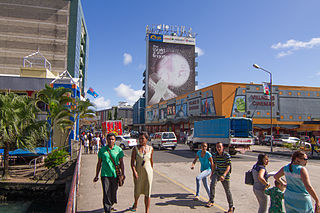
Suva is the capital and largest city of Fiji. It is the home of the country's largest metropolitan area and serves as its major port. The city is located on the southeast coast of the island of Viti Levu, in Rewa Province, Central Division.

Melanesia is a subregion of Oceania in the southwestern Pacific Ocean. It extends from New Guinea in the west to the Fiji Islands in the east, and includes the Arafura Sea.
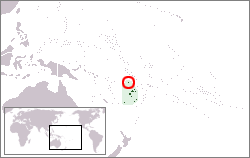
Rotuma is a self-governing heptarchy, generally designated a dependency of Fiji. 'Rotuma' commonly refers to Rotuma Island, the only permanently inhabited and by far the largest of all the islands in the Rotuma Group. Officially, the Rotuma Act declares that Rotuma consists of Rotuma Island as well as its neighbouring islands, rocks, and reefs across the entire Rotuma Group. The dependency is situated around 500 km west of the French islands of Wallis and Futuna and a similar distance north of the Fijian mainland. Its capital is Ahau, a hamlet consisting of a number of colonial-era buildings. Rotuma exists as a dependency of Fiji but itself contains its own sociocultural enclave known traditionally as Faguta. Composed of the districts of Juju and Pepjei, Faguta and its inhabitants have a unique identity reflected in Marist practices of worship, French orthography for written Rotuman and a specific set of dates for the Fara festival. Faguta's special character was effectively agreed to by all Rotuma's chiefs in 1871 in the Treaty of Hamelin.
Fijians are a nation and ethnic group native to Fiji, who speak Fijian and English and share a common history and culture.
The House of Chiefs in Fiji consists of the Fijian nobility, composed of about seventy chiefs of various ranks, majority of which are related. It is not a formal political body and is not the same as the former Great Council of Chiefs, which was a political body with a prescribed constitutional role, although the membership of the two bodies did overlap to a great extent.

Bau is a small island in Fiji, off the east coast of the main island of Viti Levu. Bau rose to prominence in the mid-1800s and became Fiji's dominant power; until its cession to Britain, it has maintained its influence in politics and leadership right through to modern Fiji.
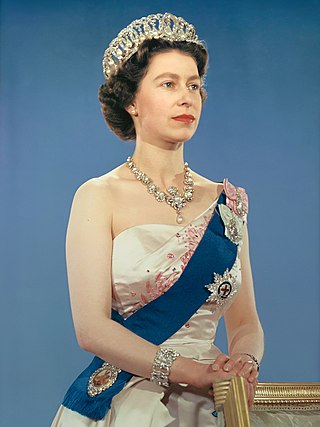
The monarchy of Fiji arose in the 19th century, when native ruler Seru Epenisa Cakobau consolidated control of the Fijian Islands in 1871 and declared himself king, or paramount chief, of Fiji. Three years later, he voluntarily ceded sovereignty of the islands to Britain, making Fiji a crown colony within the British Empire.
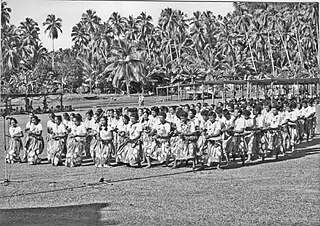
Dance in Rotuma refers to the traditional and modern dance styles performed by the people of the island of Rotuma, which became a dependency of Fiji in 1881. Despite Rotuma's political and historical links with Fiji, the island's culture shows strong Polynesian influences, particularly from Samoa and Tonga, which, along with Fiji, feature strongly in the history and traditions of the Rotuman people.

Religiously, Fiji is a mixed society, with Christianity and Hinduism being the main faiths.

The following outline is provided as an overview of and topical guide to Fiji:

The French Republic and the Republic of Vanuatu have long-standing bilateral relations which have varied over the years between tense and amicable. Vanuatu, then known as the New Hebrides, was a Franco-British condominium from 1906 to 1980, and maintained formal relations with both of its former colonial masters after gaining independence. Franco–Vanuatuan relations were rocked by a series of crises in the 1980s, and broke down completely on several occasions, with Vanuatu expelling the French ambassador in 1981, in 1984 and in 1987. Relations improved from the 1990s onwards and, today, France provides development aid to Vanuatu. The two countries also share amicable economic and cultural relations; both are members of the Organisation internationale de la Francophonie.
Indo-Fijians, also known as Indian Fijians, are Fijian citizens of Indian descent, and include people who trace their ancestry to various regions of India and the Indian subcontinent. Although Indo-Fijians constituted a majority of Fiji's population from 1956 through the late 1980s, discrimination and the resulting brain drain resulted in them numbering 313,798 (37.6%) out of a total of 827,900 people living in Fiji as of 2007.
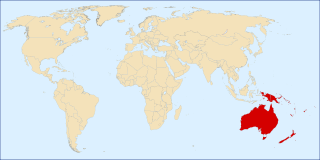
The following outline is provided as an overview and topical guide to Oceania.

The 1979 South Pacific Games, held at Suva in Fiji from 28 August to 8 September 1979, was the sixth edition of the South Pacific Games.
Netball at the Pacific Games has been an optional Pacific Games sport since 1963. Fiji have been the tournament's most successful team, winning seven gold medals. Cook Islands have won four gold medals. To date, only the Cook Islands and Fiji have won netball gold at the Pacific Games.

The majority of Fiji's islands were formed through volcanic activity starting around 150 million years ago. Today, some geothermic activity still occurs on the is lands of Vanua Levu and Taveuni. Fiji was settled first by the Lapita culture, around 1,500–1,000 years BC, followed by a large influx of people with predominantly Melanesian genetics about the time of the beginning of the Common Era. Europeans visited Fiji from the 17th century, and, after a brief period as an independent kingdom, the British established the Colony of Fiji in 1874. Fiji was a Crown colony until 1970, when it gained independence as the Dominion of Fiji. A republic was declared in 1987, following a series of coups d'état.